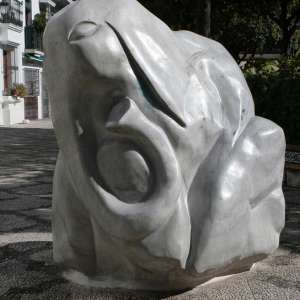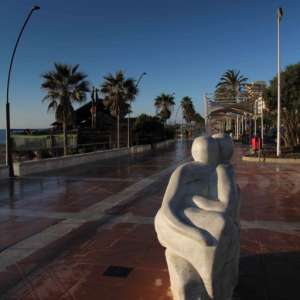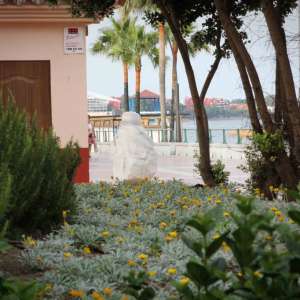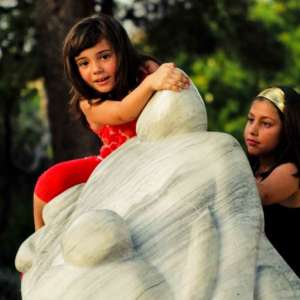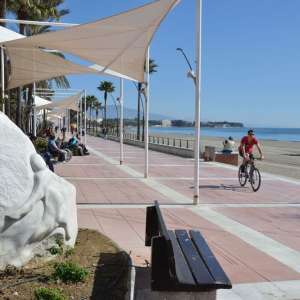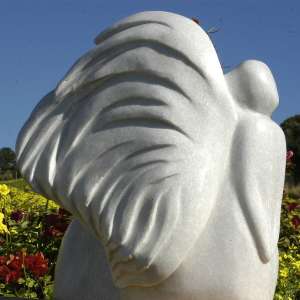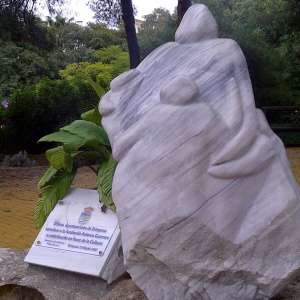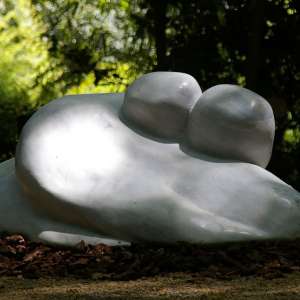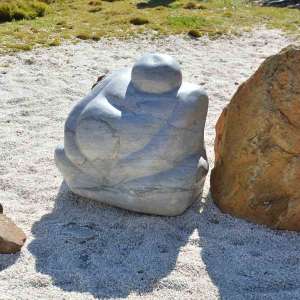About Toby Govan
Toby was born in April 1967 in Edinburgh (Scotland) from which, even though it’s a beautiful city, his parents decided migrate to the “light” of Andalusia (Spain). From the age of six he integrated totally into Spanish society.
He studied at the School of Arts of Granada. He also studied Photography in Madrid, working as a photographer for a time.
But his true master was his father, the late Douglas Govan, a well-known sculptor, who showed him his technique and the magic of “reading the stone”. His mother, Ann Govan, spectacular water-colour painter, taught him to see the world as a “composition”.
Over a period of six years he was sponsored by Sam Benady (Sammer Gallery, Puerto Banus, Spain) and Sandra Billington (S.B. Interiors, Marbella, Spain). This allowed him to flourish as an artist.
There are sculptures of Toby Govan in Spain, Germany, France, United Kingdom, United States and many other countries around the world. His latest masterpiece, “In Your Arms”, weighs three and half tons and took him eight months to create.

Feelings forever
Every piece is original in all its meaning. No stone is the same and each one is sculpted by Toby Govan.
This is te process were toby collects the stones , and he looks at their shapes ,lines and colours , and suddenly there is a suggestion of what they could be.
Aspire to be part of the everyday life of the human beings.
Lets touch!!!
When we are young we are told not to touch, usually due to fear of breaking something. What we actually broke was an essential part of the validation of the form and dimension of objects, we broke te transmissio of feelings….lets re educate our bodies to touch eacoter and everthing that you want to belong to your memory.
A Poem for Toby Govan
A Songnet Written in the Hopes that the Poet is Sculpting a Sculptor, two Sculptures and Sculpture – and that He’s Not Scalping Them All!
(An Appreciation of Toby Govan and his Work)
February 21
He’s not endowing stone with life; he’s finding it, the life that’s friezed by stone,
Then freeing it; his sculpture is not chiselling that stone, not in either sense,
It’s uncrushing current’s gushing, it’s causing cheeks to blush, it’s sinewing its bone
And enmuscling its skin; it’s depetrifying blood and tears; burlesquing all pretence
That material’s material: the most solid of his concretes are the abstracts they exude:
The carnal ripples hewn therein are far less tangible than the love and energy and care
With which the opus is accomplished, and than with which they are imbued,
But whose splendour only peacocks when of their synergy they are consciously aware.
It is perhaps the aspect most heavenly of sculpture’s highest peaks,
That something so unequivocally so palpable remains essentially a mist
Of sauntering ambivalence, whose directness oft is sneaky, and who in silence speaks:
The sculptor who can encage such wisps, engage with them, is the acme of the artist.
Which Govan is. Indeed I think a summary would say that what’s most conspicuous
About his work is that only in its talent and its beauty is it unambiguous.
Greg Dark
How Toby Govan beautifies cities?
DO NOT TOUCH!!!
As children, this is one of the first commands we hear.
There we are, recently born into this world full of glorious feelings and sensations. Gradually we learn to see, we hear interesting sounds, we touch different surfaces and materials, sense different temperatures and textures … and our imaginations run riot as everything blazes into a conflagration of all sorts of colours … then suddenly
DO NOT TOUCH!!!
We are forbidden to confirm the shape by touch, its solidity or volume, we are made to think that touching people is somehow wrong or inappropriate …
In the case of my work, however, touching it is both right and appropriate. Indeed it is designed so that, to truly understand it, the ‘viewer’ MUST touch it. I intend that touch is a meaningful part of experiencing my work, that feeling it is an essential part of ‘feeling’.
To feel it is, I hope, to enjoy it.
What people say about Toby Govan
¡Qué líneas! Es como que me reconfortan! ( What lines !! It’s like they comfort me!!)
Emmanuel L. Madrid,
What am I going to say about your work when I experience it every day in the sculpture you gave us!!

